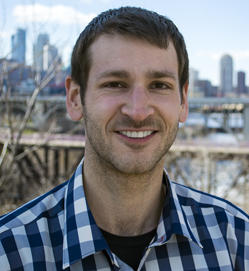
Marc Pisansky
E-mail: [email protected]
Thesis Title:
Oxytocin and epigenetic mechanisms in mouse models of empathy and autism
Undergraduate Institution and Major:
St. Olaf College, BA in Biology and Neuroscience, 2009
Current Position:
Postdoctoral Fellow, University of Minnesota
Graduate Advisor:
Jonathan Gewirtz, Ph.D.
Graduate Level Publications:
- Matveeva TM, Pisansky MT, Young A, Miller RF, Gewirtz JC. Sociality deficits in serine racemase knockout mice. Brain Behav. 2019 Sep 12:e01383.
- Pisansky MT, Gottesman II, Gewirtz JC. Oxytocin enhances observational fear in mice. Nat Commun. 2017 Dec 13;8(1):2102.
- Pisansky MT, Young AE, O'Connor MB, Gottesman II, Bagchi A, Gewirtz JC. Mice lacking the chromodomain helicase DNA-binding 5 chromatin remodeler display autism-like characteristics. Transl Psychiatry. 2017;7(6):e1152.
- Tran PV, Kennedy BC, Pisansky MT, Won K-J, Gewirtz JC, Simmons RA, Georgieff MK. Prenatal choline supplementation diminishes early-life iron deficiency induced reprogramming of molecular networks associated with behavioral abnormalities in the adult rat hippocampus. J Nutr. 2016;146:484-493.
- McBrayer ZL, Dimova J, Pisansky MT, Sun M, Beppu H, Gewirtz JC, O'Connor MB. Hippocampus and forebrain-specific loss of BMPRII affects swimming, anxiety, and object exploration in mus musculus. PLoS One. 2015;10(10):e0139860.
- Pisansky MT, Gottesman II, Gewirtz JC.Socio-communicative endophenotypes in mouse models of psychiatric disease. In: Animal Models of Behavioral Genetics.Rodent Models of Autism, Epigenetics, and the Inescapable Problem of Animal Constraint. 2015; pp.231-264.
- Pisansky MT, Wickham RJ, Su J, Fretham S, Yuan L-L, Sun M, Gewirtz JC, Georgieff MK. Iron deficiency with or without anemia impairs pre-pulse inhibition of the startle reflex. Hippocampus. 2013;23:952-62.
- Doud AJ, Lucas JP, Pisansky MT, He B. Continuous three-dimensional control of a virtual helicopter using a motor imagery based brain-computer interface. PLoS One. 2011;6:e26322.
Graduate Level Abstracts:
- Pisansky MT, Gewirtz JC. Intranasal oxytocin enhances socially transmitted fear behavior in mice. Presented at the 2015 Society for Neuroscience annual meeting; Chicago, IL. November 2015.
- Young A, Pisansky MT, Gewirtz JC. Socio-communicative deficits in serine racemase knockout mice. Presented at the 2015 Society for Neuroscience annual meeting; Chicago, IL. November 2015.
- Pisansky MT, O’Connor M, Gottesman II, Bagchi A, Gewirtz JC. Deletion of the Chd5 chromatin remodeler in mice results in socio-emotional and transcriptional features of autism. Presented at the 2015 Wisconsin Symposium on Emotion; Madison, WI. April 2015.
- Pisansky MT, Gewirtz JC. Social fear learning in mice using a novel conditioned place aversion paradigm. Presented at the 2014 Pavlovian Society Annual Meeting; Seattle, WA. September 2014.
- Gewirtz JC, Pisansky MT, Wickham RJ, Su J, Fretham S, Yuan L-L, Sun M, Georgieff MK. Iron deficiency impairs prepulse inhibition of the startle reflex in mouse and rat models. Presented at the 2013 Society for Neuroscience annual meeting; San Diego, CA. November 2013.
- Doud AJ, Lucas JP, Pisansky MT, He B. Three-dimensional virtual helicopter control: frontiers in brain-computer interface. Presented at the 2011 IEEE EMBS Conference on Neural Engineering; Cancun, Mexico. April 2011.
Professional Presentations:
- Brain Club, U of MN, 2015
- MidBrains Neuroscience Consortium, Bethel University, 2015
- Neuroscience Capstone Course, Carleton College, 2015
- Interview Weekend, Psychology, 2015
- Recruitment Weekend, GPN, 2015
- Colloquium, GPN, 2014
- Neuroscience Club, St. Olaf College, 2012, 2013, 2014
- Spring Research Day, Center for Cognitive Sciences (UMN), 2013
Thesis Committee Members:
- Michael O'Connor, Ph.D., Department of Genetics, Cell Biology and Development (Chair)
- Anindya Bagchi, Ph.D., Department of Genetics, Cell Biology and Development
- Jonathan Gewirtz, Ph.D., Department of Psychology
- Irving Gottesman, Ph.D., Department of Psychology
Description of Graduate Research:
My research investigates social cognition (empathy) using mouse behavioral paradigms. I approach this research with a range of genetic models, pharmacological agents, and neuromodulatory techniques. Ultimately, my research aims to uncover the neural substrates of socio-emotional processes within the brain, and translate this knowledge to understanding endophenotypes of psychiatric diseases.
Research Categories:
- Behavioral and Cognitive Neuroscience
- Neuroimaging and Optogenetics
- Neurogenetics
- Neuropsychiatric Disease
Graduate Level Awards and Honors:
- MnDRIVE Neuromodulation Fellowship, 2015-2016
- Stark Award for Advanced Scholarship, 2015
- Sping and Ying Ngoh Lin Award, 2013
- Training Program in Cognitive Sciences, 2012-2014
- GPN/Milne-Brandenburg Award, 2012
Rotations:
- Angus MacDonald III, Ph.D., Department of Psychology
- Kelvin Lim, M.D., Department of Psychiatry
- Jonathan Gewirtz, Ph.D., Department of Psychology
- Cheryl Olman, Ph.D., Department of Psychology
GPN Committees:
- Student Board, Fourth and Fifth Year Representative, 2014-2016
- Center for Cognitive Sciences Executive Committee Pre-Doctoral Representative, 2013-2015
- Mentorship Committee Co-Head, 2012-2013
- Center for Cognitive Sciences Colloquium Committee, 2012-2015
Professional Outreach:
- Brain Awareness Week, Various, 2009-present
Professional Memberships:
- Social and Affective Neuroscience Society, 2015 – present
- Pavlovian Society, 2014 – present
- Center for Neurobehavioral Development (UMN), 2011 – present
- Center for Cognitive Sciences (UMN), 2011 – present
- Society for Neuroscience, 2009 – present
Why Did You Choose UMN?
Student Mentor And The Best Advice They Gave.
Don't sweat the small stuff. It's a marathon, not a sprint. Develop means of stress relief (exercise, friends, and/or happy hour!). If you don't fail, you can't succeed.
